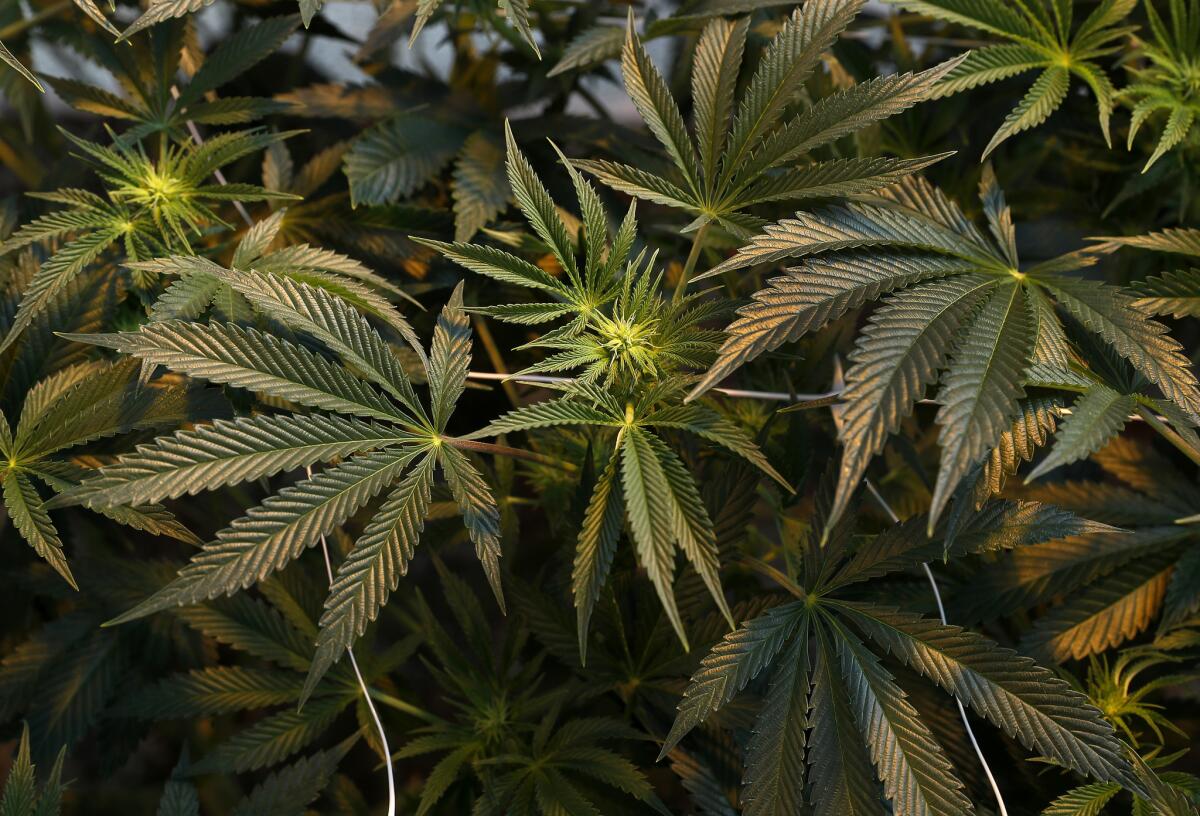Column: Looking for an issue to unite a divided nation? That would be marijuana

- Share via
We may be a deeply divided nation, but there’s one thing we agree on across the political gulf: pot.
In every state, blue and red, where it was on the November ballot, cannabis reform passed.
The citizens of Arizona, Montana, New Jersey and South Dakota approved marijuana for recreational use. In Mississippi and South Dakota, voters approved it for medical use.
There are now 35 states where cannabis is legal for medical use, and 15 (including California, of course) where it is legal for adult recreational use.
The only thing standing in the way of common-sense nationwide cannabis regulation is the preposterous insistence on the part of the federal government that marijuana is a dangerous drug with no currently accepted medical use, on a par with heroin and LSD.
But that is starting to change.
Last week, the House of Representatives voted 228 to 164 to decriminalize cannabis by removing it from the Controlled Substances Act. The MORE (Marijuana Opportunity Reinvestment and Expungement) Act would also expunge nonviolent marijuana convictions, redress some of the harm done to people of color by the failed war on drugs, and, of course, tax it. Five Republicans and Michigan independent Justin Amash voted for it; six Democrats voted against. Four Democrats and 34 Republicans did not cast votes.
“The federal government has lied to the people of this country about marijuana for a generation,” declared Florida Rep. Matt Gaetz, the only Republican co-sponsor of the bill. “We have seen a generation — particularly of Black and brown youth — locked up for offenses that should not have resulted in any incarceration whatsoever.”
There is, at the moment, no chance that the Senate will take up the issue, given Majority Leader Mitch McConnell’s (R-Ky.) aversion to pot.
If Georgia goes all the way blue, however, and elects two Democratic senators in January to flip the balance of power in the Senate, federal marijuana reform has a real shot.
There is no getting around the fact, as Gaetz said, that the primary casualties in the misguided war on marijuana have been people of color.
Study after study has shown that Black people are arrested and incarcerated for pot-related crimes at far higher rates than white people, even though marijuana usage rates are essentially the same across racial lines. A recent American Civil Liberties Union study found that Black people are 3.6 times more likely to be arrested over pot possession than white people.
The fallout from those arrests can last a lifetime.
“These harms include not only arrests, incarceration, and lifelong criminal convictions,” said the report, “but also the loss of jobs, housing, financial aid eligibility, child custody and immigration status.”
The number of Americans who think cannabis should be legal has changed dramatically in the last few years. In September 2019, the Pew Research Center found that 59% of adults favored total legalization, 32% favored medical use and only 8% said cannabis should be entirely illegal.
Has the trend toward legalization softened police attitudes toward marijuana? Not exactly.
In 2018, officers made 663,000 arrests tied to pot-related offenses, 92% of which involved possession, according to FBI data. In 2019, the number dropped to 545,000. But that is still scandalously high.
“I often remind people that it may seem like everyone from Martha Stewart to John Boehner are involved in the [cannabis] industry, but that doesn’t mean it’s not the biggest driver of arrests in this country,” said Natalie Papillion, director of strategic initiatives for the Last Prisoner Project, a new nonprofit dedicated to freeing the 40,000 people still imprisoned for nonviolent marijuana offenses. (Among its co-founders is Steve DeAngelo, the Oakland cannabis entrepreneur and activist.)
“American law enforcement makes more arrests for marijuana than for all violent crimes combined,” said Papillion. “We’re not busting drug kingpins or cartel bosses. We are continuing to employ a tremendous number of our limited law enforcement resources to bust people for smoking a joint.” That’s just insane.
But there are glimmers of hope that the justice system is starting to come around.
On Tuesday morning, thanks in part to the work of the Last Prisoner Project, the country’s longest-serving nonviolent marijuana convict walked out of the South Bay Correctional Facility in Florida after spending 32 years behind bars.
Richard DeLisi, 71, was sentenced in 1988 to 90 years in prison for marijuana trafficking and conspiracy to traffic. While in prison, he lost his parents, his wife and a son. Under the circumstances, I think I would be bitter. But DeLisi, who is in poor health, has expressed only sorrow and shame.
“I was convicted of breaking the laws and I am truly sorry for what I did that was unlawful,” he wrote to Florida Gov. Ron DeSantis in a plea for release in August. “There is no undoing my actions. The consequences I have accepted and every day I have tried to better myself and do what I can for others. I hear things on the outside have changed, and that cannabis companies have been treated as essential services during this virus.”
Can you imagine spending almost half your life in prison for selling a product that is now considered essential?
It’s heartening that Americans are able to come together in support of a rational approach to cannabis.
Now if the Senate could only do the same.
@AbcarianLAT
More to Read
A cure for the common opinion
Get thought-provoking perspectives with our weekly newsletter.
You may occasionally receive promotional content from the Los Angeles Times.











